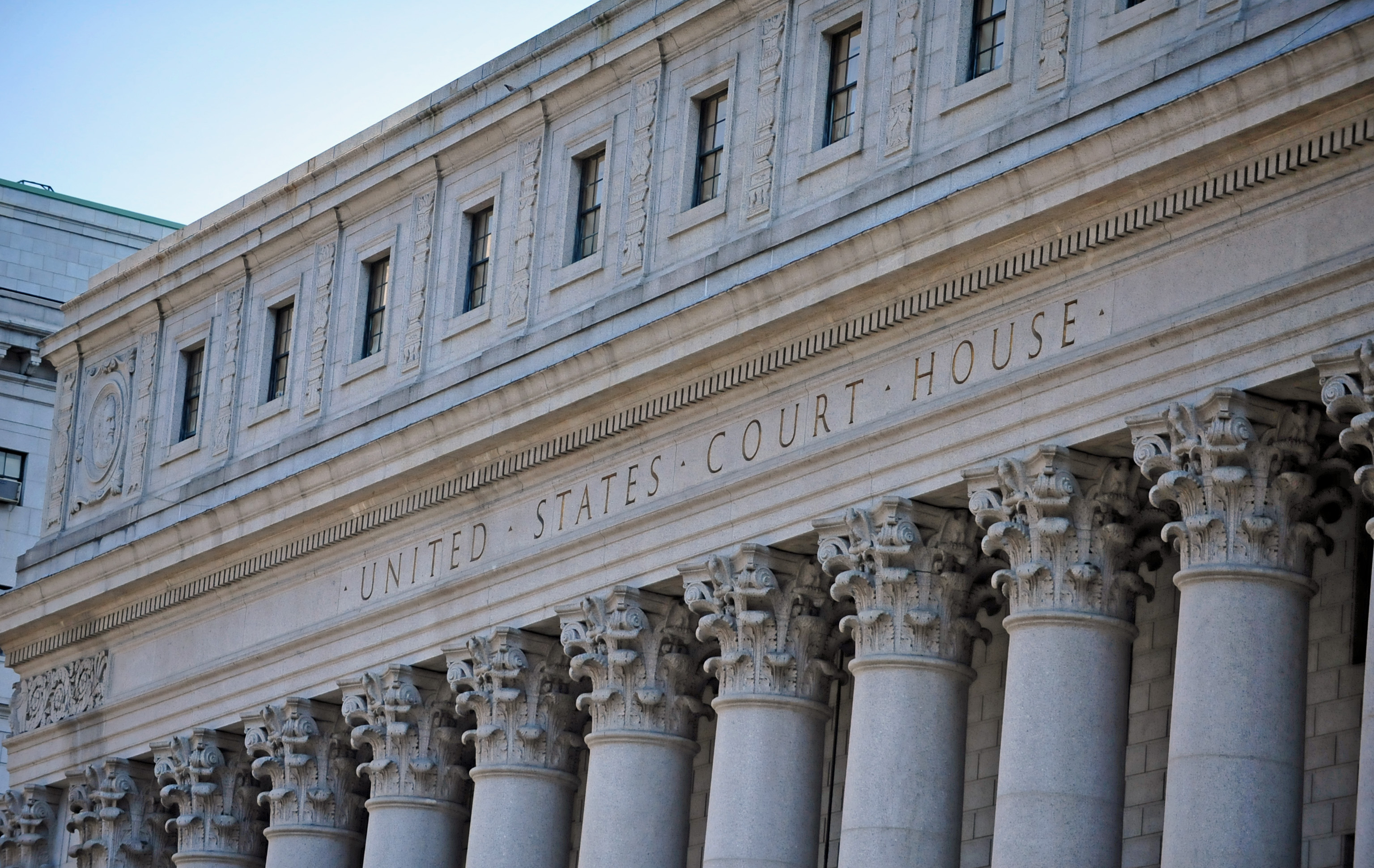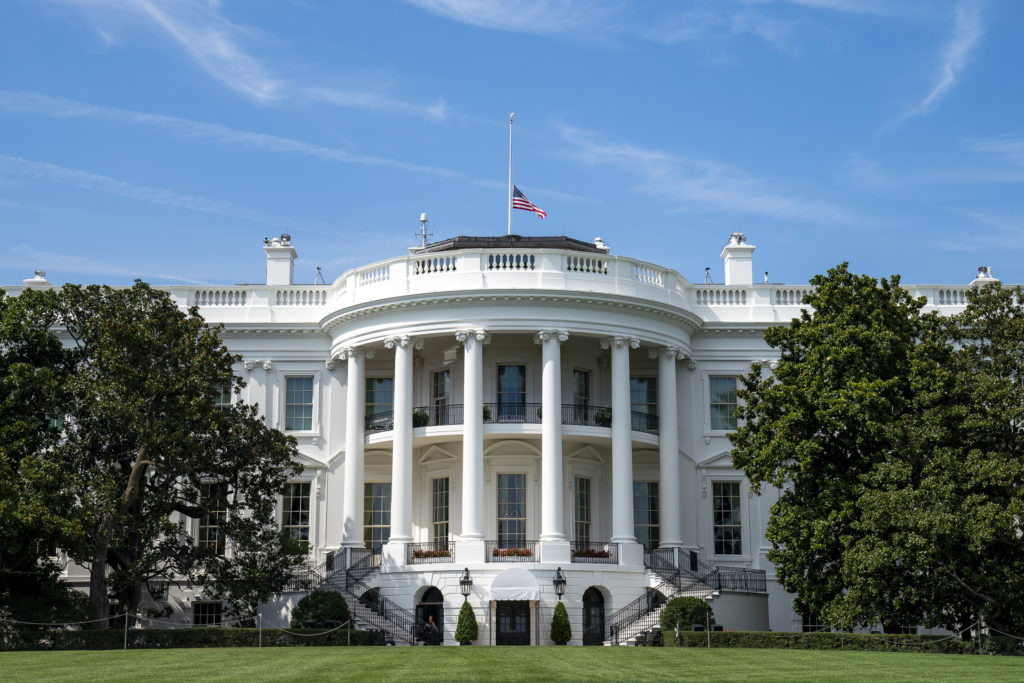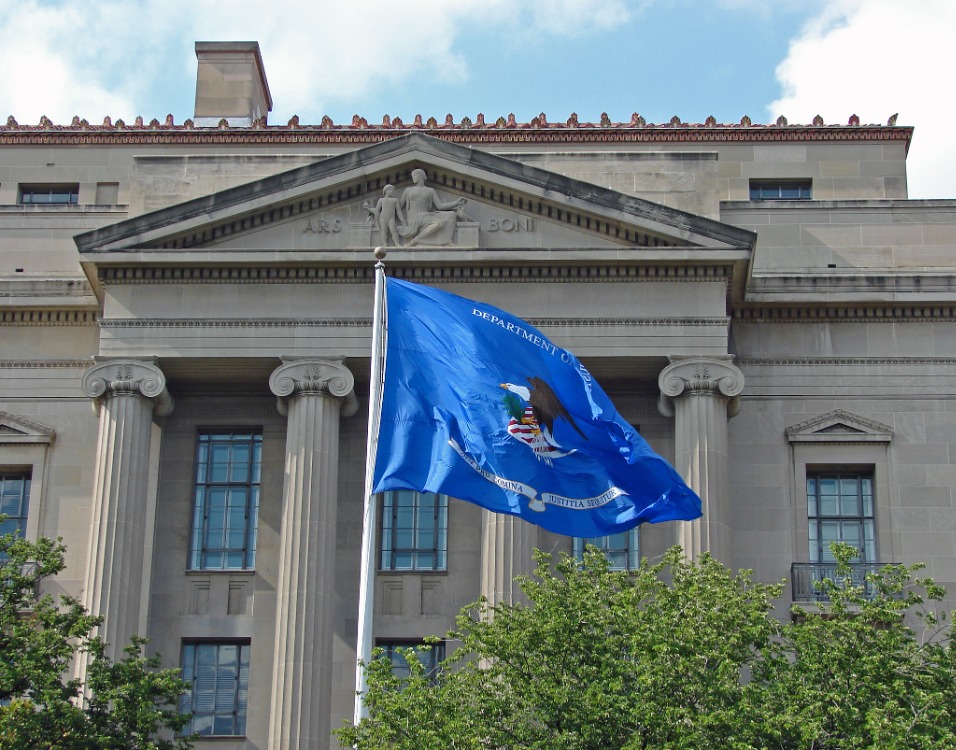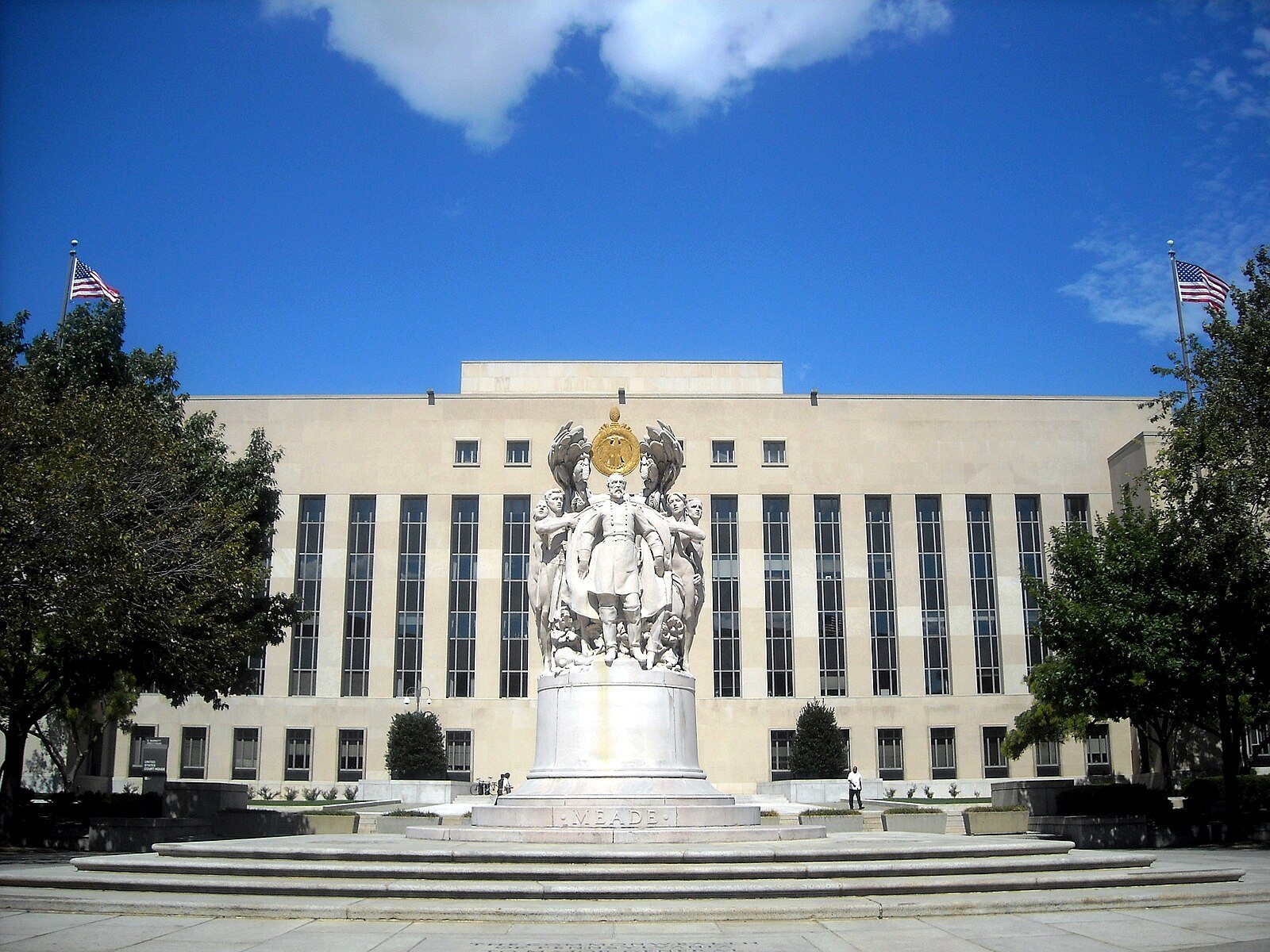Does a Civil Rights Law Prohibit Lies About Voting?
The U.S. Court of Appeals for the Second Circuit weighed the question during oral arguments in United States v. Mackey.

Published by The Lawfare Institute
in Cooperation With

On Nov. 1, 2016, a Twitter account that had amassed a significant following as a pro-Trump troll posted a tweet encouraging supporters of Hillary Clinton to “vote from home” by texting “Hillary” to a listed phone number. The tweet from @TheRickyVaughn appeared designed to generate confusion among Clinton supporters: The encouragement to vote by text featured an image using the Clinton campaign’s logo, along with a photo of a Black woman holding an “African Americans for President Hillary” sign. The post generated alarm online, and after an outcry, Twitter banned @TheRickyVaughn from its platform.
At the time, the community of far-right Trump supporters convening online laughed over the image as an example of “meme magic,” crowing over their power to shape online discussion. But the Justice Department, it seems, was not amused. In 2021, the U.S. Attorney’s Office for the Eastern District of New York announced its prosecution of “Ricky Vaughn,” real name Douglass Mackey, on civil rights charges. Mackey was convicted in March 2023 and sentenced to seven months in prison. He appealed the conviction—and this past week, the U.S. Court of Appeals for the Second Circuit heard oral arguments in his case, weighing whether the “vote from home” meme represented a criminal attempt to trick Clinton supporters out of casting their ballots.
The facts of Mackey’s case are, in some ways, a throwback—a reminder of a time when Donald Trump was still an insurgent, long-shot candidate, well before anyone imagined that Twitter might be purchased by Elon Musk. But United States v. Mackey has particular resonance right now in the months before the 2024 election. The chaotic 2016 vote directed a new political focus toward the risks posed by falsehoods circulating on social media. Four years later, Trump’s lies about the outcome of the 2020 election made those risks even more stark. Now, heading toward November 2024, the Second Circuit must consider to what extent existing criminal law provides the federal government with tools to counter certain forms of election lies, and how those tools can be squared with the protections of the First Amendment.
The Justice Department charged Mackey under 18 U.S.C. § 241, a Reconstruction-era civil rights statute that criminalizes conspiracies to “injure, oppress, threaten, or intimidate any person ... in the free exercise or enjoyment of any right or privilege secured to him by the Constitution or laws of the United States.” Historically, the department has used § 241 to prosecute attempts to interfere with access to the franchise—a reflection of the statute’s origins in the 1870 Enforcement Act, passed to combat a violent terror campaign by white Southerners to prevent Black Americans from exercising their right to vote. More recently, § 241 was among the three statutes with which Special Counsel Jack Smith charged Donald Trump for his effort to overturn the 2020 election, alleging that Trump’s scheme to hold on to power constituted a “conspiracy against the right to vote and to have one’s vote counted.”
Mackey’s prosecution appears to be the first instance in which the Justice Department has used § 241 to combat the distribution of election disinformation. The department seemed to hint as much in a November 2023 hearing on Mackey’s motion for release pending appeal: “I think it’s fair to say that a case exactly like this has not been prosecuted,” said Assistant U.S. Attorney Erik Paulsen.
This novelty is key to Mackey’s arguments on appeal. He contends that § 241 does not apply to schemes to trick voters out of casting a ballot, and that the government’s understanding of the statute would “render it grotesquely overbroad under the First Amendment”—sweeping in all kinds of protected speech and allowing the Justice Department to prosecute a vast range of conduct. “The Government’s theory would equally prohibit false statements bearing on whether to vote,” Mackey argues in his opening brief before the Second Circuit, along with “every lie told about a candidate’s background, endorsements, or policies, whether to promote or undermine the candidate” in the eyes of potential voters. First Amendment expert Eugene Volokh similarly warned in an amicus brief that this reading “would dramatically expand Section 241’s scope and transform it into a boundless, indeterminate criminal prohibition on any speech that the government (later) deems injurious to constitutional rights.”
What’s more, the specifics of the statute are such that the government must show that § 241 defendants had fair notice of violating “clearly established” law. How, Mackey says, could he have known of a “clearly established” prohibition on deceiving voters when such a case had never been prosecuted? “What we have here is an extremely vicious dog that has not barked,” argued Mackey’s attorney Yaakov Roth before the Second Circuit on Friday. (Roth also argued that the government lacked venue to bring the case in the Eastern District of New York.)
In the government’s view, though, the dog has barked plenty. “A scheme where the subjective intent of the individuals involved is to make sure that people’s vote is not cast or that it is not counted … those are kind of the key actions they talk about in 241 voting cases,” argued Paulsen.
Over the course of oral argument, the panel weighed whether Mackey’s very 21st-century experiment in voter suppression was an awkward fit for the 19th-century statute or a natural extension of the conspiracies that the Reconstruction Congress aimed to prevent. For all this jumping back and forth across centuries, the judges seemed largely unfazed by the technical quirks of a prosecution focused on a Twitter meme—although at one point Chief Judge Debra Livingston expressed confusion over Mackey’s avatar on the platform, which depicted the actor Charlie Sheen wearing a MAGA hat and the mask of a supervillain from a Batman movie. (“I believe the defendant just thought it was funny,” explained Paulsen.)
Is posting an exhortation to vote by text the equivalent of constructing a fake ballot dropbox, the judges wondered? Is it the same as a scenario where an election worker or volunteer instructs an illiterate voter to mark the wrong line on a ballot—as in United States v. Fields, in which the Fourth Circuit upheld the § 241 convictions of three men who filled out the ballots of illiterate voters in line with their own preferences? What if a volunteer told a voter to write their vote on a slip of paper and the volunteer would cast a ballot for them, but the volunteer “did that with the intent that he was going to throw the vote in the garbage can?” asked Judge Reena Raggi. What if someone sought to dissuade people from voting by lying about a candidate’s substantive positions—or claiming that the election was rigged, so there was no use in voting?
Under Roth’s preferred reading of the statute, § 241 would prohibit only coercive interference with the vote—like “a group of KKK members standing outside the polls” to threaten Black voters into turning around and going home, he said. (At times, he also seemed to suggest that this element of coercion overlapped with the question of whether a government official was involved in the potential violation, such that conduct by state actors would be more clearly coercive under the statute.) That would place Mackey’s conduct well outside the bounds of the statute, or at the very least suggest that his deception was not “clearly established” as a violation of § 241.
But the panel seemed skeptical of the scope of activity that Roth’s interpretation of the statute would leave untouched. A private volunteer tricking someone into writing down their vote on a piece of paper and then throwing the paper away, for example—“I don’t think that would be a clearly established violation of this statute,” Roth said. What if Mackey hadn’t posted an image about texting to vote, but had instead set up a fake website where voters could supposedly click a link to vote online? In Roth’s view, that wouldn’t be a clearly established violation either.
Still, he argued, this constrained interpretation of § 241 is necessary, because if the statute criminalizes deception, “we are then on a slippery slope that leads directly into a collision with the First Amendment.”
Rejecting the distinction between coercion and deception, the government sought to draw a different line—one that, Paulsen argued, meant the slope was not quite so slippery after all. Deceit falls inside § 241’s scope, Paulsen said, if it “makes you think you have cast a ballot and you haven’t.” He contrasted that with false information that “might change how you would think about exercising your own right” but didn’t do away with the right entirely. In that latter situation, “[y]ou still have the right to cast the vote you want, and it’s either counted or not.” This prevents § 241 from becoming a free-floating prohibition on election falsehoods, as does the statute’s “high bar” of requiring that the government prove a conspiracy.
The months following Mackey’s sentencing and appeal featured consternation among the commentariat about the potential First Amendment implications of the Twitter troll’s case. In a campaign video, Trump himself accused the Biden administration of unjustly prosecuting Mackey for the crime of “sharing a joking meme about Hillary Clinton several years ago.” Generally, though, the Second Circuit seemed less than alarmed about Roth’s warnings of runaway prosecutions of First Amendment-protected speech. Still, the judges pushed Paulsen to identify the precise boundaries of § 241’s prohibitions.
“What if,” asked Judge Raggi, “the lie is that the morning of the election, there are lots of tweets that go out saying that a particular candidate has died, and it’s not true? And that prompts any number of supporters not to go to the polls and vote?”
“Your Honor, I think you may be stepping into a gray area there,” allowed Paulsen. But, he emphasized, “that’s not this case.”
The Mackey prosecution speaks to both the possibilities for responding to election lies under existing law, and the limitations of what the government can achieve through criminal process. If the Second Circuit adopts the government’s view of § 241—either by ruling that lies like Mackey’s constituted a clearly established violation of the statute when Mackey took that step in 2016, or by clarifying that § 241 applies to such lies going forward—then the Justice Department will gain a potentially powerful tool with which to protect the right to vote from malicious tricksters. That tool is most powerful as a deterrent, signaling to the Ricky Vaughns of 2024 that any comparable attempts will potentially net you prison time for your troubles. Amid widespread concerns about election integrity and the spread of falsehoods on social media, that’s no small thing.
Even if the court takes a narrower view of § 241, that would leave open the possibility of future legislation. As this case shows, the First Amendment is not an absolute prohibition here. Mackey’s argument does not “necessarily foreclose[] a narrowly tailored law to combat knowingly false statements about the time, place, and manner of an election,” he acknowledges in the briefing. Likewise, in his amicus brief, Volokh suggests that “narrow, clear statutes that target knowingly false speech concerning the time, place, and manner, or other technical mechanics of an election” would likely be permissible under the First Amendment. As Volokh notes, some states have already adopted statutes along these lines. Federal legislation along those lines passed the House of Representatives in 2007, and another iteration was introduced in the Senate in 2021.
It should go without saying that none of this will resolve the problem of election falsehoods once and for all. Even the most expansive vision of § 241 as viewed by the government would leave untouched, say, manipulated video of a presidential candidate slurring his words. Still, something is better than nothing. Narrowly scoped prosecutions of election lies are one piece of a much larger puzzle when it comes to election integrity—much like the Federal Communication Commission’s (FCC’s) ban on robocalls generated by artificial intelligence, which followed an incident in which New Hampshire voters received messages in Joe Biden’s voice telling them not to vote in the 2024 Democratic primary. That FCC effort didn’t solve everything, either, but it adds just a bit more of a deterrent for anyone considering that kind of dirty trick.
These efforts by the government are all the more crucial going into 2024 because of the sorry state of affairs on the part of social media platforms. Major platforms like Meta and Google have slashed their content moderation teams in pursuit of cost-cutting, and under Elon Musk, Twitter—now X—outright welcomes falsehoods and far-right content. A great deal has changed about American politics and social media over the past eight years, but looking back from 2024, perhaps the most obviously outdated aspect of the @TheRickyVaughn Twitter account is that the platform bothered to take it down.





